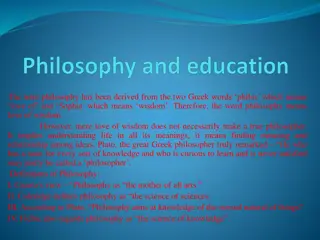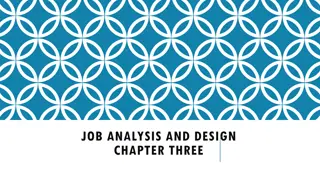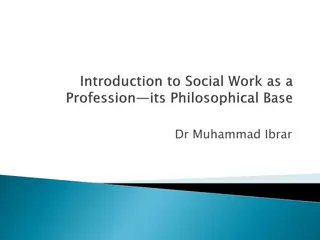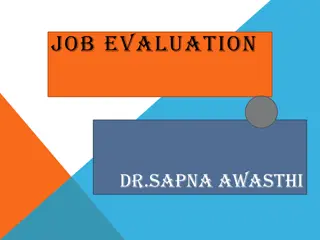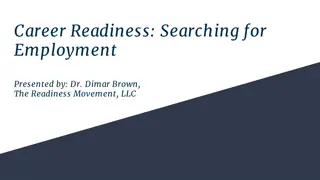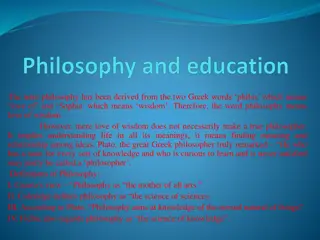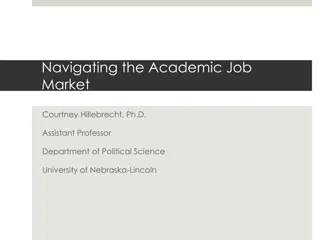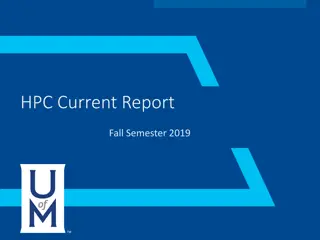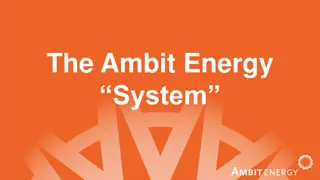Navigating Academic Job Prospects in Philosophy 2019
Delve into the intricate world of academic job prospects in philosophy in 2019. Explore diverse career paths, from research positions to teaching roles, and considerations for pursuing a PhD. Reflect on the importance of liking research, potential job uncertainties, and the evolving landscape of academic opportunities.
Download Presentation

Please find below an Image/Link to download the presentation.
The content on the website is provided AS IS for your information and personal use only. It may not be sold, licensed, or shared on other websites without obtaining consent from the author.If you encounter any issues during the download, it is possible that the publisher has removed the file from their server.
You are allowed to download the files provided on this website for personal or commercial use, subject to the condition that they are used lawfully. All files are the property of their respective owners.
The content on the website is provided AS IS for your information and personal use only. It may not be sold, licensed, or shared on other websites without obtaining consent from the author.
E N D
Presentation Transcript
Job prospect Wonder Philosophy 2019
Why think about it now? Actually, it s more important to think about it now than during your PhD. What do you intend to do with a PhD? What if that doesn t work out? Are there things you could do you didn t know about? General rule: more backup plans allow for less strategic planning.
Types of academic jobs Research job at an R1 institution Low teaching load + high research output demand Research job at an R2 institution Greater teaching load + high research output demand Secure teaching job at a 4-year university or LAC High teaching load + some research demand (depending on prestige) Secure teaching job at a community college High teaching load + high administrative demand Post-doctoral fellowship Contract-based teaching job (adjunct)
Do you like research? Most graduate students start graduate school liking research. And it is expected that you like research. It is *very* difficult to make it through grad school without liking research, even if you end up with a teaching/industry job. R1 professors are expected to spend ~60% of their time researching (20% teaching and 20% administration). Realistically, professors at R1s are almost exclusively evaluated based on research (up until Associate, at least).
Do you actually like research? It is common to lose your interest in research momentarily or entirely during the grad school process. When that happens: there is nothing wrong with you. Research is the kind of thing you never know if you truly enjoy it until you try to do it for some time. However, it is sometimes risky to express hesitation towards research in the profession, especially in prestigious programs/conferences. In fact, a good way to assess climate of a department is to see how many of its faculty/senior grad students openly express enthusiasm in teaching.
Do you like research that much? On the other hand, it s also hard if all you want to do is research. This is increasingly true now that there are more competent researchers than there are jobs. Re: https://www.timeshighereducation.com/blog/if-you-love-research- academia-may-not-be-you Pure research jobs are rare in philosophy.
The elusive R1 R1 jobs pay the most and have the most prestige, hence they are the hardest to come by. According to APDA s survey of Of 7,433 graduates (2011-2016): 49% are in a permanent academic job 33% are in a temporary academic job 7% are in a nonacademic job 12% have unknown placement.
PGR-ranked prestige vs. TT placement rate (2012-14 grads) Jonathan Weisberg, https://jonathanweisberg.org/post/prestige-placement/
Analysis of placement of 2012-2017 graduates Helen De Cruz, Prestige Bias: An Obstacle to a Just Academic Philosophy, https://quod.lib.umich.edu/e/ergo/12405314.0005.010?view=text;rgn=main
Average time from graduation to TT Lee Elkin (ljelkin), https://github.com/ljelkin/jobplacement/blob/master/README.md?fbclid=IwAR249l8uXrAhLsGrwbQkwUIlShuI7KVxvVBbjb pbi1iiy-JU3_M8i3vL2Ls
The elusive R1: bottom line There is a huge prestige bias. I have been told to not bother with not-PGR-top-20 schools because you won t find a job. That s a little extreme, but it certainly poses a challenge for top R1 jobs. Even if you re lucky to get an R1-TT, you most likely will end up at a school you ve never heard of & don t think is good. It usually takes 6-7 years for a PhD and 2-3 years before landing a TT (assuming you re lucky).
Do you like teaching? Here s the irony: you re not supposed to like teaching throughout graduate school, but you have a much better job prospect if you re willing to teach. Teaching jobs come in different degrees of prestige, too. Prestigious Liberal Arts College (LAC) Other SLAC Community College (CC) It is actually really hard to find good data on teaching (because the majority of the profession doesn t care about it).
How much do you like teaching? Prestigious LACs usually require competitive research profiles as well as demonstrated teaching excellence. CCs: low pay, high teaching & administrative demands, usually poor classroom facilities. However, if you re geographically constrained, CCs/not-prestigious SLACs give you the best chance to support yourself where you want to be. (You might not think you re geographically constrained now but that might change.)
How to be competitive for teaching jobs Most prestigious (and probably many non-prestigious) programs aren t good at supporting students for teaching jobs. So you need to plan for yourself. Take courses widely & especially in mainstream topics. Even if your dissertation is on bioethics, you will have to teach: traditional ethics, political philosophy, critical thinking, M&E, Descartes. Look into teaching certificate programs early in your career. Many schools offer some form of it but it may take some time to complete.
Going into PhD with the goal of teaching While it s possible that you may start loving research and hating teaching as you progress in your graduate career, I have seen more people moving in the opposite direction. If you are serious about wanting to teach, I recommend making it a priority when you visit programs. Ask faculty about campus teaching opportunities and see how much they know; ask whether they have experience placing teaching-focused students. https://philosopherscocoon.typepad.com/
What is an adjunct? Adjunct professors are typically hired: On a contract-basis: no job security As part-time: no benefits With lower pay grade: sometimes below hourly minimum wage & below poverty line As non-voting members: are not involved in departmental decision making; typically creates a sense of isolation. The treatment of adjuncts varies vastly across schools, but most (big) schools treat their adjuncts poorly. Adjuncts are also often not unionized.
Why do people adjunct? Adjunctships are easy to get. They are often hired to teach intro-level large classes at big schools. Many big schools don t care about their undergrad quality of education very much, which means they sometimes don t screen for adjunct qualification as rigorously. Sometimes adjuncting is the only way to pay the bills at hand.
Some good reasons to adjunct Some senior graduate students adjunct as a way to 1) supplement paycheck, 2) acquire teaching experience. E.g., yay Alysha and her Cal State Fullerton crew! Adjuncting as a student is a great way to be more competitive in the teaching market. There are permanent adjunctships too. They are not common but good if you just want to teach and not do research or administration. Some places pay adjuncts reasonably well with reasonable security. It s one feasible way to live where you want to live while supporting yourself with philosophy.
Some bad reasons to adjunct Very often, though, students start adjuncting after graduation because they didn t find other jobs and needed to support themselves. Most adjunctships are very time-consuming with little pay, leaving no time to build a more competitive research profile I know someone who s rumoured to juggle 3 adjunctships and has a 60-hour weekly workload of teaching alone. Unfortunately, the adjunct problem disproportionally hits low-income students because they are more likely to have to immediately support themselves after graduation.
Plan B According to the APDA, 33% of students graduated between 2011-2017 were in temporary positions in 2017. This includes post docs, of course, but it s still a big number. In general, it is worth thinking about what you would do to support yourself if the job search doesn t work out for a couple of years after you graduate. Relatedly, remember also that only about half of admitted students finish their PhDs.






